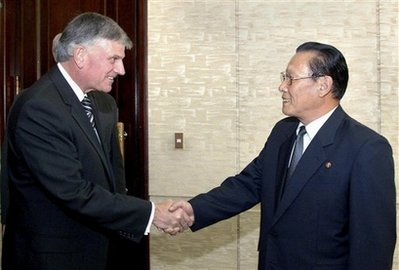American evangelist and humanitarian chief Franklin Graham said it is vital for the United States government to hold direct talks with North Korea, expressing support of the U.S. move to send an envoy to Pyongyang this week for discussion.
Graham, who had just visited North Korea in October for humanitarian purposes, pointed to former President Richard Nixon and communist China as examples of using dialogue to open the path to improved relations between two at-odds countries.
“I’m not saying that we agree with them, but you got to talk to them face to face,” Graham said, according to OneNewsNow. “Look what happened when Nixon…went into China, secretly…to meet with Mao Tse Tung, who had killed like 60 million of his own countrymen."
“Nothing happened in a dramatic way on that first visit,” the head of the relief agency Samaritan’s Purse acknowledged. “But…it broke the ice and we began to talk to this communist government…and look where we are today.”
Graham, who is also president of the Billy Graham Evangelistic Association, has visited North Korea three times and his father, evangelist Billy Graham, has visited the country twice and met with then-President Kim Il Sung. The younger Graham often highlights the deep ties his family has with North Korea, stating that his late mother, Ruth Bell Graham, had attended a mission school in Pyongyang prior to the Korean War.
Moreover, the relief agency he heads, Samaritan’s Purse, has worked in North Korea since 1997, he notes. Samaritan’s Purse has distributed tons of relief supplies, including food and medicine, as well as built medical facilities to help the impoverished people of North Korea.
"I'm going as a minister of Jesus Christ with a message of peace and that God loves each one of us regardless of our borders or politics," Graham had said before departing for North Korea in October.
This week, Washington broke with its long-held policy of no direct communication with North Korea by sending U.S. envoy Stephen Bosworth to Pyongyang to negotiate differences over the nuclear issue.
After the talk, a spokesman for North Korea’s foreign ministry said the two countries agreed to continue cooperating to “narrow remaining differences,” according to the official Korean Central News Agency.
“Through business-like and frank discussions, the two sides were able to deepen mutual understanding, narrow differences in views and find considerable common ground,” the state media said.
North Korea also agreed on the need to resume six-party talks on nuclear disarmament, but Bosworth on Thursday, after returning from his three-day trip, said it is still unclear if Pyongyang will really return to the negotiation table given that no date was set.
The six-party talks include the two Koreas, Japan, China, Russia and the United States. The discussions focus on North Korea abandoning its nuclear ambition in exchange for aid and security guarantees. In April, North Korea stopped participating in the talks and soon after restarted its nuclear program.
Despite the failure to confirm a date for resumed talks, U.S. Secretary of State Hillary Clinton described the visit as “quite positive.”
“The approach that our administration is taking is of strategic patience in close coordination with our six-party allies," Clinton said.
"And I think that making it clear to the North Koreans what we had expected and how we were moving forward is exactly what was called for," she added.
Washington and Pyongyang are expected to hold more direct bilateral meetings in the future.















